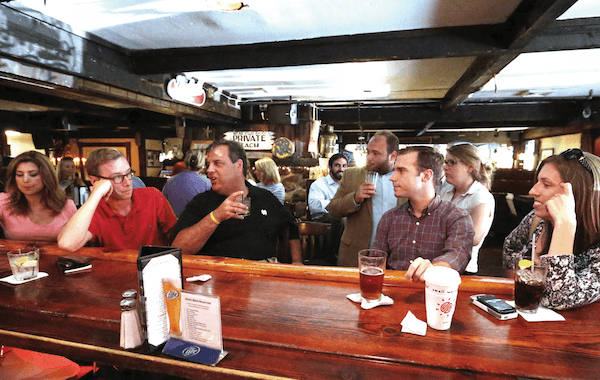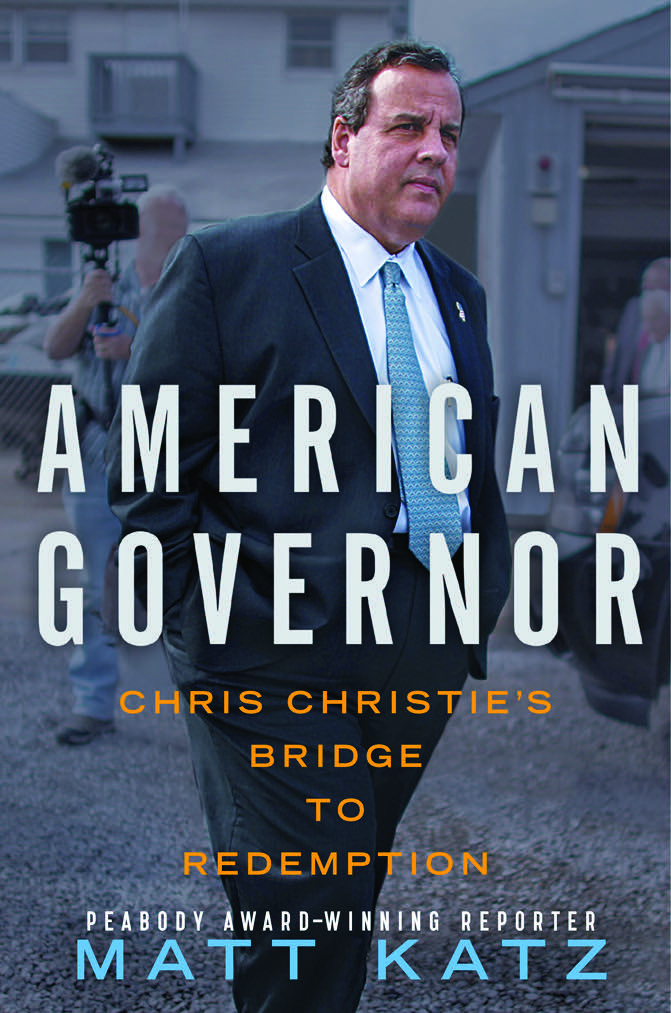
Matt Katz
Photo by Avi Steinhardt
When the word Bridgegate and the name Chris Christie were slapped across nearly every major publication in South Jersey, there was another name – in much smaller font – that was just as important.
Matt Katz, a former writer for the Philadelphia Inquirer and current WYNC political reporter, was first to break the scandalous story.
“We broke the news live on air. It was very exciting,” he says. Working with colleague Andrea Bernstein, “we were able to uncover what was going on. We waded through thousands of documents, we broke news stories off it, we put together charts and sticky notes on bulletin boards to try to make the connections and piece this crazy scheme together with all the various players.”
Katz and Bernstein eventually won the Peabody Award for their 2015 series focusing on the scandal of the lane closures on the George Washington Bridge, titled “Chris Christie, White House Ambitions and the Abuse of Power.” Bernstein had experience reporting on the Port Authority, giving her a special perspective. And Katz – well, Katz’s expertise was Christie.
Katz and Christie go way back. When the journalist returned from his month-long assignment in Afghanistan – where he penned a series that won the Livingston Award for International Reporting – he needed a new beat.
It just so happened that his editor at the Philadelphia Inquirer had an idea.
“My editor said, ‘There’s this new governor,’” Katz says. “‘He’s something else. You should go to Trenton and start covering him.’”
Katz said no. Not interested. But his editor pushed – the governor was “something different” and Katz would be covering him in a non-traditional way, following him everywhere he goes, reporting on everything he does.
“I was frankly drawn to the notoriety of being the beat expert, the governor expert,” Katz says. So, finally, he agreed.
In 2011, Katz started covering New Jersey’s new and “different” governor. The new focus – following Chris Christie’s every move – changed the trajectory of Katz’s career.
Katz covered the governor for more than five years – through Christie’s rise to presumed Republican Party presidential nominee and down to his fall through the Bridgegate Scandal. In fact, Katz has covered Christie longer than anybody else.
“I did it for so long, other people who were on a similar beat moved on,” Katz says. “It was a very cool experience to learn as much as possible about one thing, which happened to be a person, and to really try to ‘own’ this person.”
Though Katz was never the governor’s booster, he certain flew along on Christie’s coattails. The more prominent the governor became, Katz says, the more times he was asked to talk on newscasts about Christie.
 “I got a new job because of it,” Katz says of his current position at WYNC. “I got a book deal because of it. It gave me more varied journalistic experience I otherwise wouldn’t have had.”
“I got a new job because of it,” Katz says of his current position at WYNC. “I got a book deal because of it. It gave me more varied journalistic experience I otherwise wouldn’t have had.”
Katz’s book, “American Governor: Chris Christie’s Bridge to Redemption,” was published at the beginning of this year by Simon & Schuster. The best phrase to describe “American Governor” is probably “exhaustively reported,” as the New York Daily News called it.
American Governor provides an insider look at exactly what happened to Christie’s presidential campaign, including all the stories behind Bridgegate that Katz could get his hands on. The book tells the unusual tale of how an atypical politican like Christie quickly rose through the ranks to be the Republican forerunner for the 2016 election – only to watch it all come crashing down.
“It kind of gave me whiplash,” Katz says. “His fall was very rapid and dramatic. It was a Shakespearean and tragic fall, if you’re Chris Christie.”
Katz says Christie got extraordinarily positive television and national coverage before the Bridgegate scandal – even when local papers were running negative stories about Christie, the governor would still be greeted with a hero’s welcome on morning talk shows.
But then, of course, it all changed.
“Suddenly, all they wanted to talk about is what a terrible person he was,” Katz says. “He was a hero on the internet, and now there are memes mocking him. It’s unbelievable how quick and swift his fall was.”
Watching that fall was exhausting and challenging for Katz. He wanted to write his book, but that meant he was eating, sleeping and breathing Chris Christie and Bridgegate.
“The most challenging part was writing it as news was breaking,” Katz says. “Do I feel like covering Bridgegate news all day, coming home at night, seeing the family for a couple hours and then going back to trying to write my book until 3 or 4 am?”
 Keeping perspective, Katz says, was a constant challenge. Things would happen day-by-day, but he had to constantly be aware of the larger narrative wound through what would eventually become a 464-page biography. What likely made the situation even harder was that Katz and his team were the ones breaking most of the news.
Keeping perspective, Katz says, was a constant challenge. Things would happen day-by-day, but he had to constantly be aware of the larger narrative wound through what would eventually become a 464-page biography. What likely made the situation even harder was that Katz and his team were the ones breaking most of the news.
The experience breaking Bridgegate, though, was thrilling, Katz says. And probably would have been very exciting to a younger Katz as well – the reporter says he’s been interested in newspapers and breaking news since he was a kid. His parents would read the paper at the breakfast and dinner tables, and hand Katz a shorter children’s section to read.
From there, he started reading the sports page and became interested in the prospect of making journalism a career.
“I wanted to be a newspaper reporter in middle school, probably sixth grade,” Katz says.
Covering politics, though, didn’t come until later – even though speaking to Katz about the topic makes it seem like he’s been covering the ins and outs of political scandals since birth. Like most reporters, Katz started covering just about everything for a Morris County paper – local politicians, crime, education, features. When he joined The Philadelphia Inquirer, he began covering state and national politics, including a four-part series he wrote on state politics at play in Camden.
But today, looking back, it’s the Christie beat that gave Katz his extensive skill set, he says.
“The radio, the book, the magazine stories – it all kind of stems from this Christie beat,” Katz adds. “It’s really given me opportunities to learn many different things journalistically.”
It also gave Katz the opportunity to learn more about Christie than anyone.
“I think he’s quite charming,” Katz says. “He has an excellent sense of humor. One thing that’s misunderstood is the different speeds he has. He can be quite sensitive, almost tender at moments, but he obviously can also scream and fly off the handle.”
The working relationship Katz might have once had with Christie, however, is now gone.
“He told me through an intermediary that I’m dead to him,” says Katz, who spent much of 2016 covering the presidential election. “But I don’t actually know why that is. He never told me why. That happened shortly after the book came out, and he dropped out of the race. We haven’t spoken in probably eight months.”













